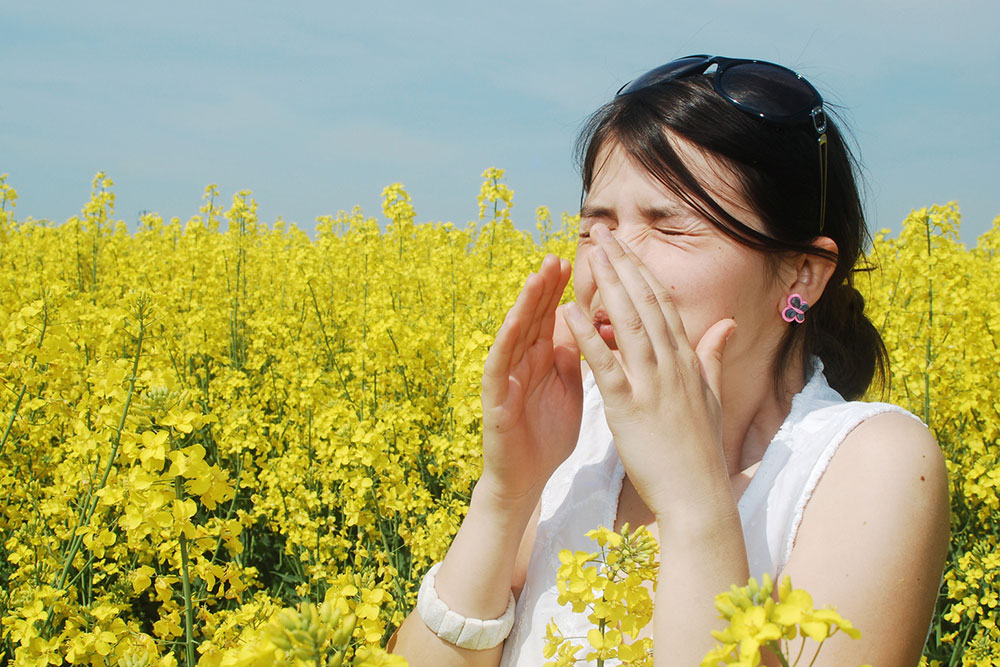All You Need to Know about Pollen Allergies
Pollen is a very fine yellowish powder produced by flowers, trees, weeds, and grasses to help fertilize other plants of the same species. Sometimes, these pollens, when inhaled by people, cause an adverse immune response, leading to pollen allergies. In fact, many people in the country are allergic to pollen.
Normally, the body’s immune system guards the body against harmful raiders, such as bacteria and viruses, to keep all illnesses at bay.

What to Do if You are Allergic to Pollen?
Once a person has developed pollen allergy, he is quite unlikely to get rid of it. However, there are some remedies that offer pollen allergy relief. Apart from medications, making certain lifestyle changes can also help to manage the allergy symptoms. Here is a complete guide to pollen allergies, along with some effective home remedies that offer instant relief.
Different Types of Pollen Allergies
Several types of pollens exist in nature. This is the reason why some people experience symptoms when trees are flowering, while others experience symptoms when the grass is growing.
People may have an allergy to the following pollen types:
- Trees such as oak, birch, and cedar
- Grasses
- Weeds such as ragweed, tumbleweed, and sagebrush
Generally, it is seen that grasses are the most common source of allergy.
If you are not sure about which pollen type you are allergic to, you can consult a specialist. This information is particularly important as every plant grows at a different time of the year. Knowing which pollen causes allergy can help you decide exactly when to start taking medications and precautions.
Symptoms of Pollen Allergy
People who are allergic to pollen experience the following symptoms:
- Nasal congestion
- Running nose
- Watery eyes
- Sinus pressure, often leading to facial pains
- Coughing
- Slight loss of hearing
- Scratchy throat
- Increased asthmatic reactions
- Swollen, bluish skin beneath the eyes
Diagnosis
Doctors use two types of tests to diagnose pollen allergy:
- Skin Prick Test (SPT)
In this test, the doctor pricks different areas of the body and puts a small drop of all possible allergens. If you are allergic to the substance, you will develop swelling, redness, and itching at the spot within 20 minutes. Also, you might see a raised area that looks like a hive. This is known as the weal . Bigger the weal , the more likely that you are allergic to the substance. - Specific IgE Blood Test
This method is helpful if the person has some skin condition or is taking medications that might interfere with skin testing. In this, a person’s blood sample is collected and sent to the laboratory, where a small amount of allergen is added to it. The doctor then measures the number of antibodies produced by the blood to attack the allergens.
Treatment for those Allergic to Pollen
The best pollen allergy relief can be achieved by avoiding the allergen. In order to minimize your pollen exposure, stay indoors on windy days, avoid yard or gardening work during peak seasons, keep your doors and windows closed when pollen counts are high, and wear a dust mask when pollen counts are high.
If the symptoms persist despite these preventive measures, you can opt for medication. There are several over-the-counter medicines that can help ease the symptoms.
In some cases, people have to opt for allergy shots if the medications are unable to provide relief. These involve a series of injections that contain the allergens. After a span of time, the body gets used to the trigger, reducing the severity of allergic reactions.
Effective Home Remedies for People Allergic to Pollen
Apart from medications, there are several home remedies that can prove to be highly effective for relieving the symptoms of pollen allergy.
- Use HEPA (High Efficiency Particulate Air) filters in central air conditioning vents to keep pollens out
- Try herbs such as PA-free butterbur or Spirulina
- Consume probiotics to improve the symptoms of allergy
- Consume 2,000 milligrams of Vitamin C daily
- Diffuse essential oils such as peppermint or eucalyptus oil into the air
- An enzyme called Bromelain is considered to be effective for improving breathing
- Change clothes every time you come inside from outside to minimize pollen exposure
In case your symptoms get worse despite taking medications, it is important to get medical help. Also, consult your doctor before starting with any new supplements or herbs to avoid any kind of side effects.